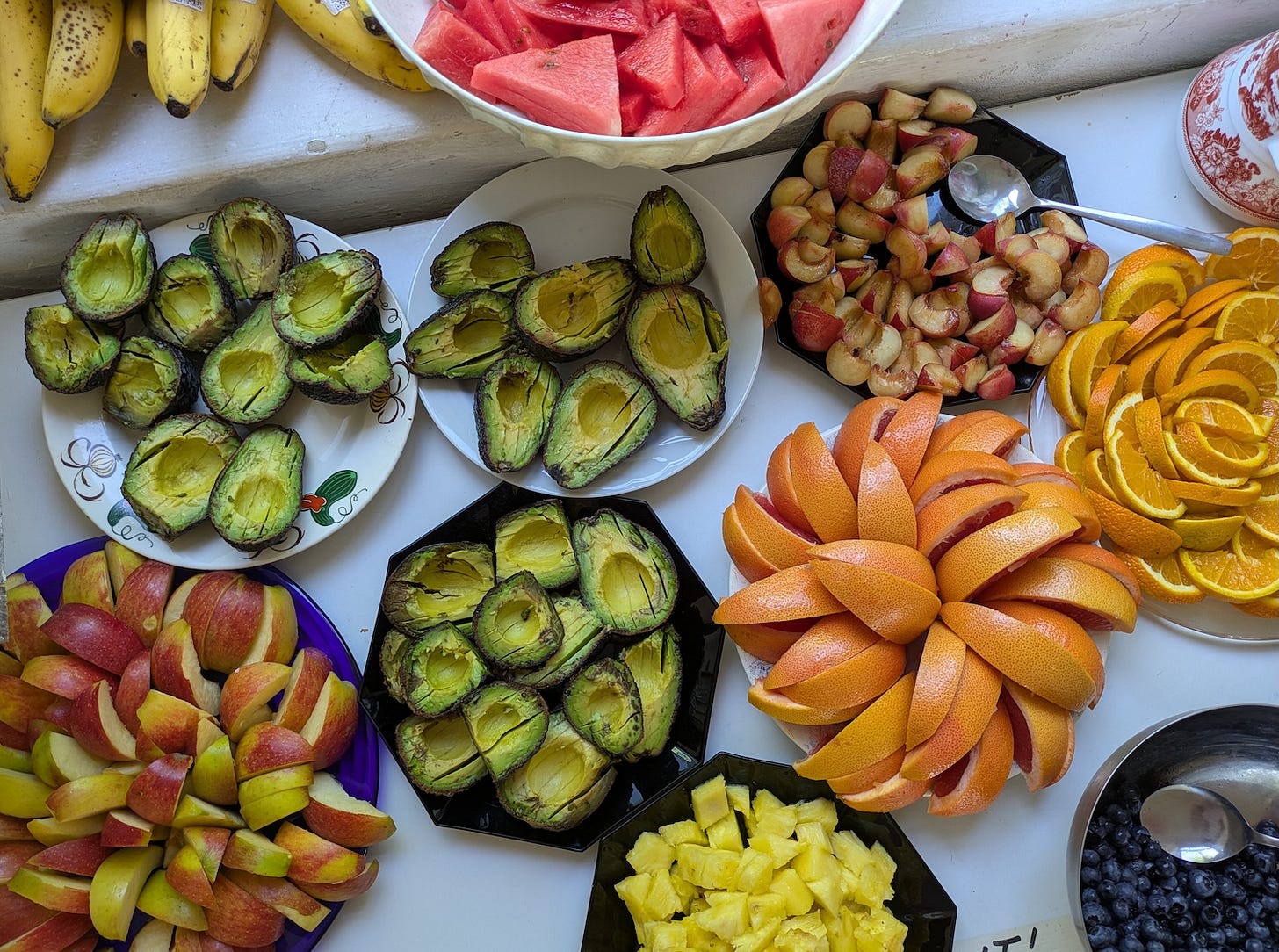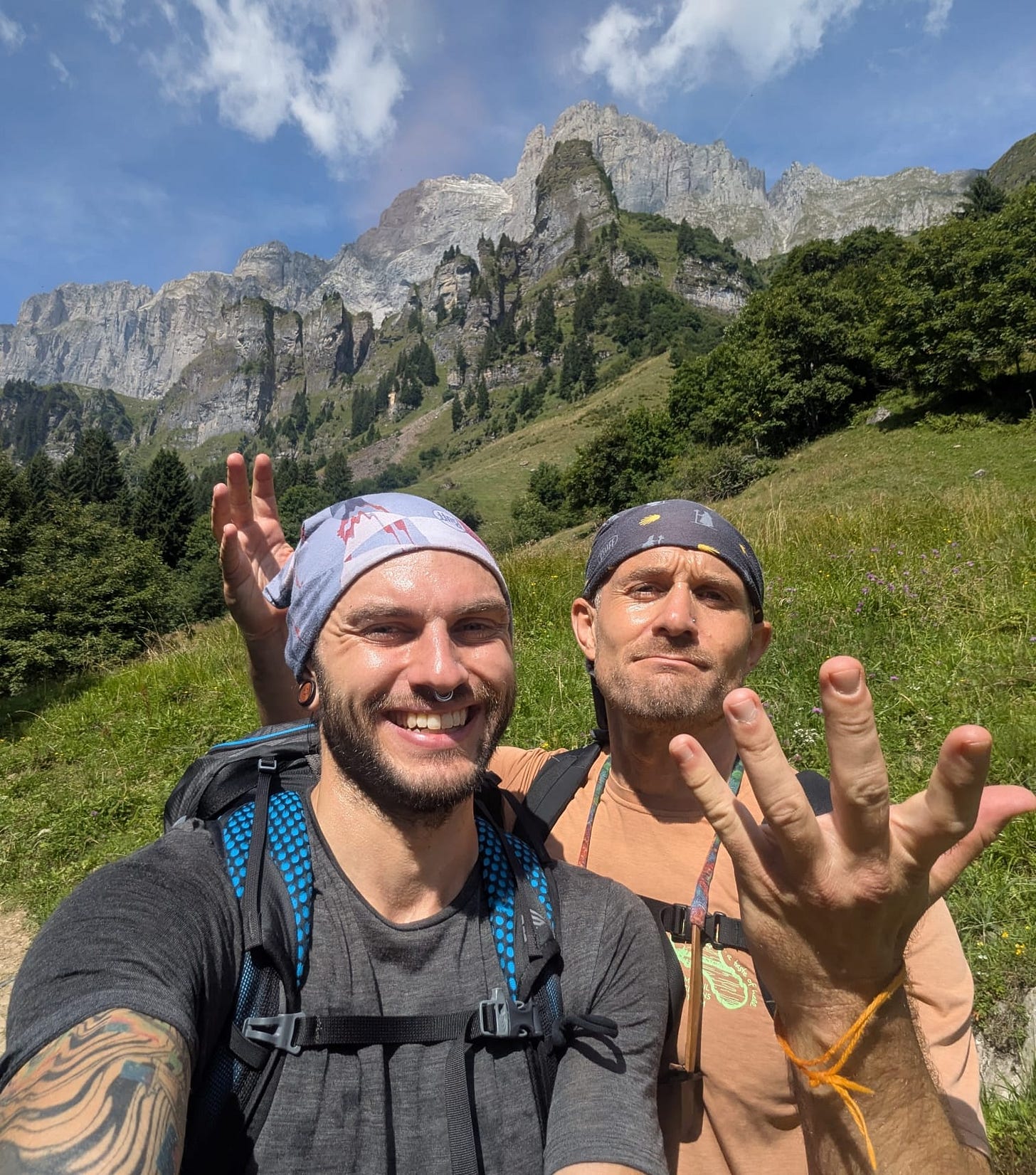I Don't Want a Nuclear Family, I Want a Galactic Commune
on the pursuit of quality conversation
The fancy Swiss restaurant is filled with men and women in tidy pairs, saying nothing.
Some stare at their phones. Some stare into the empty space over their partner’s shoulder. Some watch their partner pick at a dinner plate.
Every now and then, a couple shares a murmur, a smile, or a nod of understanding—and then four eyes return to the void.
My friend Nate and I are hiking through a remote region of Switzerland, and the fancy hotel-restaurant is the best and only place to stop for the night. The 20-bed hiker dormitory (separate from the hotel) has plenty of space, and the restaurant is the only food for miles. So here we are: two scraggly, hungry, colorfully outfitted hikers, giddy and tired from our eight-hour walk with 1400-meter (4600-foot) ascent, perched inside an aviary of respectable Swiss couples who drove their nice cars up a nice mountain pass for a nice dinner.
The waitress asks what we’d like to drink. Nate requests Leitungswasser (free tap water). The waitress responds, still or sparkling? Nate tries again with different words and a wide, “help a brother out” smile. That is not possible. Oh, well—we’ll fill our bottles at a bathroom sink later tonight.
The meals are sumptuous: juicy meats and crisp vegetables float atop beds of creamy carbohydrates, the cheapest plates on the menu at $40 a pop.
But what’s most delicious is the conversation.
Nate and I are both Americans living in Europe, united by our love of mountains and dance. Alongside mutual friends we’ve already taken a few Alps adventures. Now we’re comfortable hiking with just each other, and we have so much to discuss: recent dance weekends, ongoing love affairs, personal struggles, future plans, cultural comparisons, the next day’s logistics, and the endlessly fascinating habits, neuroses, and sex lives of the small army of houseflies that seems to inhabit every high-altitude dining establishment in Switzerland.
We stand out in this restaurant, not only because of how we look and speak, but by the sheer breadth, depth, and exuberance of our conversation.
This is how I like it.
I like conversations that never run dry and leave us hungering for more. I like hip-hopping and flip-flopping between the practical and philosophical. I like discovering how another complex, autonomous being navigates this world. I like catching up, revisiting old threads, and recalling (over and over again) why I find a particular person so delightful. I want the endless horizon: always more to learn, share, dissect, and realize.
And I’m sure that if Nate and I spent multiple months hiking together, we would run out of things to talk about—and we could easily become one of those quiet pairs, each giving more attention to a phone, book, or internal world than the flesh-and-blood person in front of us.
This is what scares me about long-term, monogamous romantic partnership—and by extension, the nuclear family.
I recognize the trust, security, and connection that arise in long-term romantic relationships. I’ve tasted them. They’re wonderful. And they come at a price.
Every capital-R Relationship reduces the time and attention available for other relationships, most notably friendships. Every Relationship brings depth and understanding (which can encourage rich conversation), but also breeds predictability and saturation (which can discourage it).
One person is just that: one person. You can’t expect endlessly vibrant conversation from even the most fascinating person. Every fascinating eventually becomes familiar—and from there, it’s a short trip to a silent dinner table.
Why do I fare poorly in long-term relationships but thrive in temporary communities, like summer camps, dance weekends, travel adventures, group retreats, and short-term stays with friends?
Why am I more interested in a rotating cast of characters—groups and individuals to whom I periodically circle back—rather than a year-round core?
Why, following a long period of travel, visiting friends, and intense gatherings, do I feel more sadness than relief to return to the privacy of an apartment?
One answer is: quality conversation.
Which to me means: varied, deep, and vulnerable conversation.
This is why I’m happy to sacrifice comfort, privacy, and a good deal of “normalcy” to regularly access entire ecosystems of brains at camps, gatherings, and my scattered friend communities.
This is why the college environment—especially the 50- to 125-person student co-ops where I lived for years—felt so meaningful.
And this is why living alone consistently wears me down faster than living communally.
So why not try the original form of communal living?
Start a family, and you’ll always have someone to talk to!
No one ever actually said this to me, but I feel like it’s a widely held assumption. And I don’t buy it.
Raising young children limits the scope of conversation, most brutally for mothers. You have less time to talk with other adults, and when you do, it’s fragmented, and the usual topic is… children. And while some parents seem to genuinely enjoy their extended conversations with young children, I’m skeptical about my own capacity in this department. (I’ve long observed that I most enjoy children when they can wipe their own butts and understand sarcasm.)
As kids get a bit older, I think some genuinely interesting years of conversation await. After the hike with Nate, I visited an ex-girlfriend in Switzerland with a 5- and 7-year-old. They’re super fun, and I’ve enjoyed seeing their development over recent years. To the extent that you can reclaim your adult socializing during the mid-child-rearing, perhaps you can have it all. But I still fear the triple threat of isolated nuclear families, overworked parents, and the diminishment of adult friendships during the early childhood years.
Finally, teenagers. I’ve worked with enough teenagers (and their parents) to know that there are fantastic conversations to be had, but they’re inconsistent. A teen’s priority is connecting with peers, which often means going online. As I shared in my conflicted thoughts about having kids, the chance of living in a household where every family member is holed up in separate corners of the house, glued to their respective screens, feels too real.
But without a full-time partner or kids—what remains?

What remains is community. Multiple communities, scattered across the world, the solar system, the metaphorical galaxy!
What remains are the globular clusters of other adults who say “no” to standard paths and “yes” to ever-deeper conversation, connection, and cohabitation.
What remains are the isolated nuclear families who appreciate occasional visits from old friends and itinerant travelers.
No, I don’t want to live in a real commune, where individual identity and agency are erased. Nor do I endorse capital-C Communism. I like living in individualist societies. I might even agree that nuclear families are the building blocks of such societies.
But bricks need mortar. Who will be the mortar?
If your affections run wide (as mine do), and you fear the quiet death of conversation (as I do), then perhaps it’s okay to say “no thank you” to standard relationships and prescribed family constellations.
Perhaps it’s okay to continue blazing through the galaxy like a comet, appearing periodically in far-flung solar systems, gravitationally bound to all and none.
Everyone wants to stay warm in the frigid vacuum of space. You can keep it nuclear, or you can venture widely. The universe needs both. ☄️




This made me smile. When I was 20, I had a very similar experience in an Austrian hotel/restaurant, watching older couples around me eat in silence, every once in a while one asking the other "do you need more butter" or "please pass the jam", like the fun had been sucked from their lives. I decided then and there to NEVER become those people, to travel and fill my life with exciting people and conversations always.
At 27 I met my now-husband, at the time a minor-league baseball player, and our life took us traveling all across the states and globe as he played baseball, which was great. And now at 45, long past those baseball years, we are near the age of those older couples I was watching back then. Sometimes at our lunches or dinners out, we don't have much to say to each other, and other times we do. Sometimes it's about our kids, sometimes it's about careers, sometimes it's about bigger life stuff, but it definitely is comfortable and not the exciting engagement you currently still have. There isn't much novelty in lives like ours now, where you're going through the motions of the routine, mostly for the sake of the kids who need stability and community (and who now, at ages 10 and 6 are getting to be very fun to talk to, but as you say, it's different). It's not to say it's not fulfilling in its own way, but it's comfortable, not novel.
My husband and I are set for a lunch date today and now I am going to be thinking of all of this as we sit there. What will we talk about? Are we "those" people now? We will see. :)
For 13 years I walked / hitched the roads / wildernisses and slept the streets / forests of Europe.... Sooo many good & varied conversations, experiences, friendships. Some few & brief hard times..... mostly wonderful, educational, creative adventures. Now, nearly Half a century later I am about to depart for more .......